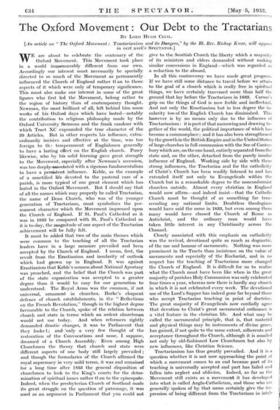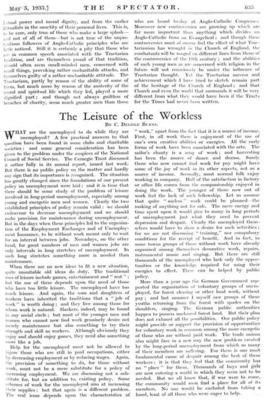The Oxford Movement : our Debt to the Tractarians
BY LORD HUGH CECIL.
[An article on " The Oxford Movement :. Tractarianism and its Dangers," by the Rt. Rev. Bishop Knox, will appear in next week's SPECTATOR.] WE are about to celebrate the centenary of the. Oxford Movement. This Movement took place in a world immeasurably different from our own. Accordingly our interest must necessarily be specially directed to so much of the Movement as permanently influenced the Church of England rather tl: an to those aspects of it which were only of temporary significance. This must also make our interest in some of the great figures who first led the Movement, belong rather to the region of history than of contemporary thought. Newman, the most brilliant of all, left behind him some works of his- Oxford days which have lasted—notably the contribution to religious philosophy made by the Oxford University Sermons and the frank candour with which Tract XC expounded the true character of the 39 Articles. But in other respects his influence, extra- ordinarily incisive and effective at the time, was too foreign to the temperament of Englishmen generally to have a lasting effect on the English church. Pusey likewise, who by his solid learning gave great strength to the Movement, especially after Newman's secession, was too deeply-associated with a rigorous fundamentalism to have a persistent influence. Keble, as the example of a sanctified life devoted to the pastoral care of a parish, is more typical of one great element which has lasted in the Oxford Movement. But I should say that of all the names which may properly be called Tractarian, the name of Dean Church, who was of the younger generation of Tractarians, most symbolizes the per- manent character .which the Movement impressed upon the Church of England. If St. Paul's Cathedral as it was in 1833 be compared with St. Paul's Cathedral as it is to-day, the magnitude of one aspect of the Tractarian achievement will be fully felt.
It must be added that two of the main themes which- were common to the teaching of all the Tractarian leaders have in a large measure prevailed and been accepted by the Church of England. I mean, first, the revolt from the Erastianism and insularity of outlook which had grown up in England. It was against Erastianism that Keble's sermon about. National Apostasy was preached, and the belief that the Church was part of the state organization was accepted to a greater degree than it would be easy for our generation to understand. The Royal Arms was the common, if not universal, ornament in churches. Burke's eloquent defence of church establishments, in the " Reflections on the French Revolution," though in the highest degree favourable to the Church, spoke of the 'relation between church and state in terms which an ardent churchman would not use today. And when reformers rightly demanded drastic changes, it was to -Parliament that they lookei ; and,- 'only a very few thought of the restoration of the Convocations and none, I suppose, dreamed of a Church Assembly. Even among High Churchmen the theory that church and state were different aspects of one body still largely prevailed ; and though the *formularies of the Church affirthed the royal supremacy in very mild terms, it was and remained for a long time after 1833 the general disposition of churchmen to look to the King's courts- for the deter- mination of spiritual issues rather than to the episcopate. Indeed, when the presbyterian Church of Scotland made its great struggle on the question of patronage, it was used as an argument in Parliament that 'you could not give to the Scottish Church the liberty which a majority of its ministers and elders demanded without making similar concessions in England—which was regarded as a reduction to the absurd.
In all this controversy we have made great progress. If we have still some distance to travel before we. attain to the goal of a church which is really free in spiritual things, we have certainly traversed more than half the ground that lay before the Tractarians in 1838. , Caesar's grip on the things of God is now feeble. and ineffectual. And not only the Erastianism but in less degree the in- sularity too of the English Church has diminished. This however, is by no means only due to the influence of Tractarianism : it is part of that narrowing and drawing to- gether of the world, the political importance of which has become a commonplace ; ,and it has also been strengthened by the growth in the British Empire and in the United States of large churches in full communion with the See of Canter- bury which are, on the one hand, entirely separated from the state and, on the other, detached from the purely insular influence of England. - Working side by side with these strong influences, the Tractarian zeal for the catholicity of Christ's Church has been readily listened to and has extended itself not only to Evangelicals within the Church but in a remarkable degree to the nonconformist churches outside. Almost every christian in England would now affirm—and indeed insist—that the Catholic Church must be thought of as something far tran- scending any national limits. Doubtless theologians would have said the same in 1833, but even among them many would have classed the Church of Rome as Antichrist, and the ordinary man would have taken little interest in any Christianity across the Channel.
Closely associated with this emphasis on catholicity was the revival, devotional quite as much as dogmatic, of the use and honour of sacraments. Nothing was more prominent in the Tracts than insistence on the value of sacraments' and especially of the Eucharist, and in no respect has the teaching of Tractarians more changed the Church of England. It is difficult for us to realize what the Church must have been like when in the great majority of parishes Holy Communion was only eelebrated four times a year, whereas now there is hardly any church in which it is not celebrated every week.* The devotional use of the Lord's Supper has indeed gone far beyond those who accept Tractarian teaching in point of doctrine. The great majority of Evangelicals now cordially agree that devotion to- Christ's great sacramental ordinance is a vital feature in the christian life. And what may be called the sacramental 'principle, that is, that material and physical things may be instruments of divine grace, has gained, if not quite to the same extent, adherents and acceptance throughout the Church, although it is assailed not only by old-fashioned Low Churchmen but also by new influences, like Christian Science.
Tractarianism has thus greatly prevailed. And it is a question whether it is not now approaching the point at which a movement comes to an end because part of its teaching is universally accepted and part has failed and fallen into neglect and oblivion. Indeed, .so far as the Movement still exists as a movement it has developed into what is called Anglo-Catholicism, and those who are generallY:Spoken of by that name certainly give the im- pression of being different from the Tractarians in intel- lectual power and moral dignity, and from the earlier itualists in the sanctity-of their persOnal lives. This is, to be sure, only .true of those who make a large splash— and not of all of them—but is not true of the unpre- tentious followers of Anglo-Catholic principles who are little noticed. Still .it is certainly a pity that those who are in common speech associated with the Tractarian tradition, and are themselves proud of that tradition, should 'often seem small-minded men, concerned with small things, provoking rather uncharitable attacks, and themselves guilty of a rather uncharitable attitude. The Tractarians, partly by reason of the ability of some of them, but much More by reason of the austerity of the moral and spiritual life which they led, played a more dignified part ; and though not always guiltless of breaches Of Charity, seem much greater men than those .who are heard to-day at. Anglo-Catholic Congresses. Moreover new controversies are growing up which arc far more important than anything which divides an Anglo-Catholic from an Evangelical ; and though these -controversies must of course feel the effect of what Trac- tarianism has wrought in the Church of England, the combatants will be ranged on different lines from those of the controversies of the 19th century ; and the abilities of such young men as are concerned with religion in the future will not consciously be under the influence of Tractarian thought. Yet the Traetarian success and achievement which I have tried to sketch remain part of the heritage of the Church of England ; and that Church and even the world that surrounds it will be very different from what they would have been if the Tracts for the Times had never been written.











































 Previous page
Previous page